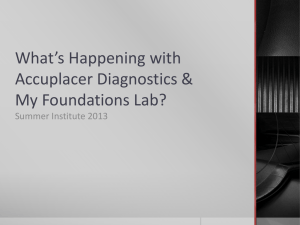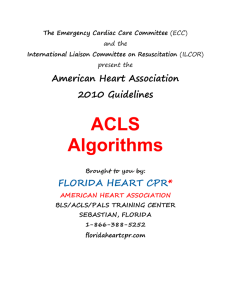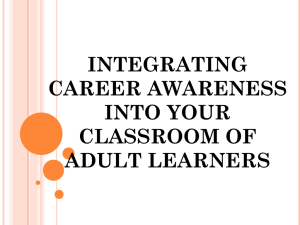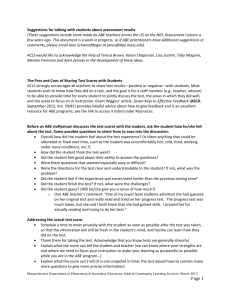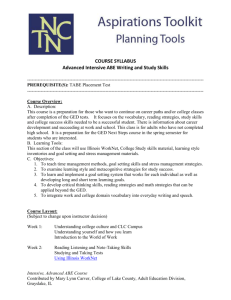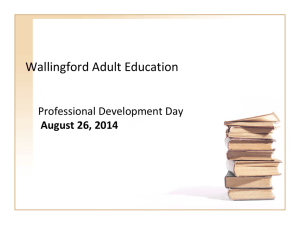January Minutes of ABE Advisory Council
advertisement
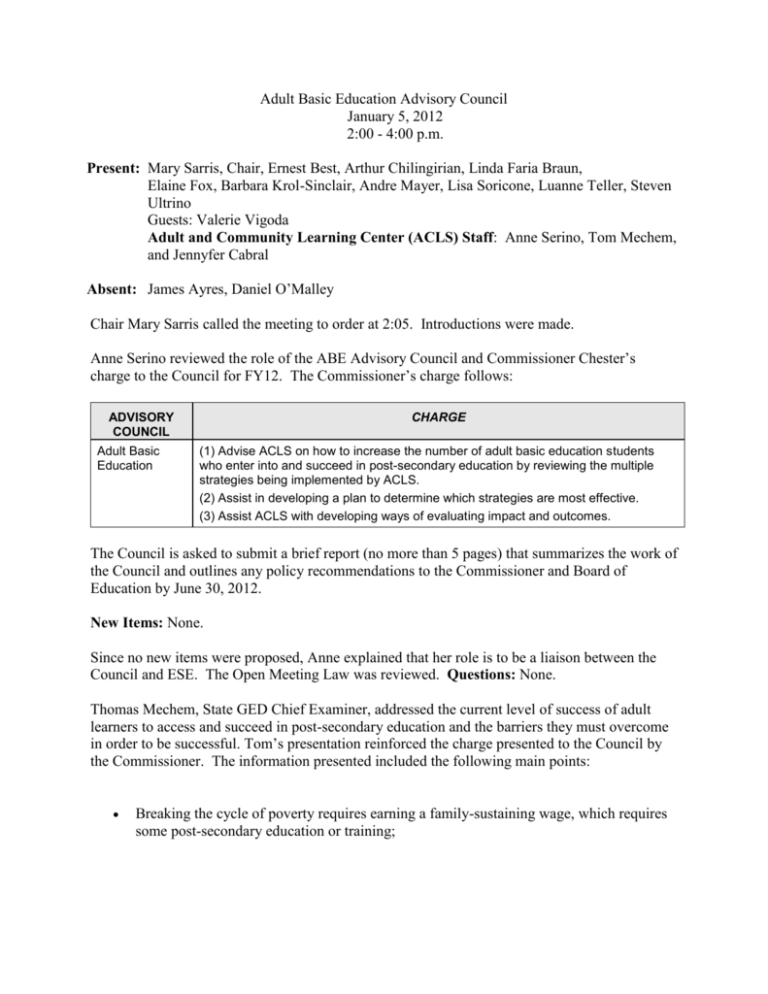
Adult Basic Education Advisory Council January 5, 2012 2:00 - 4:00 p.m. Present: Mary Sarris, Chair, Ernest Best, Arthur Chilingirian, Linda Faria Braun, Elaine Fox, Barbara Krol-Sinclair, Andre Mayer, Lisa Soricone, Luanne Teller, Steven Ultrino Guests: Valerie Vigoda Adult and Community Learning Center (ACLS) Staff: Anne Serino, Tom Mechem, and Jennyfer Cabral Absent: James Ayres, Daniel O’Malley Chair Mary Sarris called the meeting to order at 2:05. Introductions were made. Anne Serino reviewed the role of the ABE Advisory Council and Commissioner Chester’s charge to the Council for FY12. The Commissioner’s charge follows: ADVISORY COUNCIL Adult Basic Education CHARGE (1) Advise ACLS on how to increase the number of adult basic education students who enter into and succeed in post-secondary education by reviewing the multiple strategies being implemented by ACLS. (2) Assist in developing a plan to determine which strategies are most effective. (3) Assist ACLS with developing ways of evaluating impact and outcomes. The Council is asked to submit a brief report (no more than 5 pages) that summarizes the work of the Council and outlines any policy recommendations to the Commissioner and Board of Education by June 30, 2012. New Items: None. Since no new items were proposed, Anne explained that her role is to be a liaison between the Council and ESE. The Open Meeting Law was reviewed. Questions: None. Thomas Mechem, State GED Chief Examiner, addressed the current level of success of adult learners to access and succeed in post-secondary education and the barriers they must overcome in order to be successful. Tom’s presentation reinforced the charge presented to the Council by the Commissioner. The information presented included the following main points: Breaking the cycle of poverty requires earning a family-sustaining wage, which requires some post-secondary education or training; Although 75% of GED Examinees say they are taking the test for college or careers, only 43% ever enroll in post-secondary education or training and only 5% ever earn a postsecondary degree or certificate; 85% 0f GED grads entering community colleges take at least one developmental course: if they take two or more, they are five times less likely to earn a certificate or degree. The Accuplacer test---94% of GED grads entering Massachusetts community colleges end up in math developmental courses because of low scores on the math Accuplacer. The ABE system needs to address three challenges: adult learners must earn a GED diploma, "pass" the Accuplacer test, and thrive in credit-bearing college courses. Anne Serino provided members with a handout that presented the current strategies that ACLS is using to support the successful transition of adult learners to post-secondary education. These strategies include: Policy to Performance (P2P) Since 2010, Adult and Community Learning Services has led a collaborative effort of both state and local representatives of adult basic education, workforce development and community colleges whose goal follows: Design and build a continuous, connected and simultaneous set of services to facilitate Adult Basic Education students’ successful participation in postsecondary education and training services and placement in jobs. Members of P2P include Executive Office of Labor and Workforce Development (EOLWD), Department of Transitional Assistance (DTA), Department of Higher Education (DHE), Massachusetts Community College Executive Office (MCCEO) and Commonwealth Corporation. ABE programs, One-Stop Career Centers and ABE Transition to Community College programs are also represented. Through P2P, ACLS is investing $480,000 to support 8 pilot projects to support the development of regional/local collaborations of Community Adult Learning Centers, workforce development and community college partners in order to increase the number of adult learners in ESE-funded Learning Centers who matriculate in certificate or degree programs at community colleges in Massachusetts. By working with the pilots, the state partners will be able to develop more effective policies to support the transition of ABE /ESOL students to post-secondary higher education and training, and promote the alignment of these policies across the three systems. Thanks to the passage of the FY12 Supplemental Budget, ACLS was able to increase the number of funded pilots from 2 to 8 and provide $480,000 in support of the pilots. The increased number has given ACLS an opportunity not only to build the capacity of more ABE programs/collaborations to support adult learners but it has also given us the opportunity to learn a great deal more about how to bring this strategy to scale. This project is administered in collaboration with the EOLWD and the Commonwealth Corporation. Additional Pilot Projects Boston Opportunity Agenda (Hub and partners model) is funded by a collaboration of 6 foundations with TBF providing leadership. One of the goals of the BOA was to inform ESE policy. In particular, the BOA sought to influence the policy requiring all programs to provide a minimum of 3 levels of instruction by creating a “hub with partners” model. This model would promote collaboration among Boston programs – with a “hub” partner focusing on transitioning students to post-secondary education and “partner” programs providing referrals and additional supports to students. The BOA will help ACLS understand if it is effective to create a network of specialists as opposed to multiple generalists. The BOA is funding the following programs: o United South End Settlement/Roxbury Community College o JVS/Bunker Hill Community College The project is administered by World Education. Open Society Foundation Grant Awards (Focus on preparation/direct service) Massachusetts programs were eligible for the OSF funding as a result of ACLS participation in the Policy to Performance project. The OSF is funding the following programs: o Cambridge and Ludlow/Holyoke Community College – to support the successful transition of adult learners (including reentering prisoners) to post-secondary education Community Adult Learning Centers ACLS has just released its multi-year RFP to support Community Adult Learning Centers and Career Pathways for a combined $27.7M. The ABE guidelines that accompany the RFP support a significant shift from an ABE/ESOL system whose end goal was a GED to a system whose end goal must be college and career readiness for all students Several major policy changes provide programs with design choices that support college and career readiness including increased intensity and content specific classes. Supplemental class choices have been expanded to include industry specific content and college and career readiness. The policy supporting counseling has been shifted from a primary focus on education eounseling to education and career advising. The following is an excerpt from the FY13 Guidelines that describes a very different counseling function: The primary role of the Education and Career Advisor is to assist students to develop, monitor, and fulfill an individual Education and Career Plan that aligns a student's interests, goals, and abilities with a career, and outlines the steps needed to prepare for that career. This may involve: Assist each student to identify, clarify, monitor, and achieve her/his educational and career goals Assist student to set both a realistic timeline for attaining each goal and a means for determining whether the goal is achieved. Outline the educational steps that the student needs to take to achieve the career goals. Provide career planning and education/training opportunities. Refer students to resources to support the steps outlined. This can include referrals to workshops at a career center or other agency providing support for next steps. Communicate with teachers to ensure that student goals inform instruction and that the program’s instruction and services are oriented toward helping the student achieve the goal. Monitor the student’s progress toward her/his goals while in the program, provide support to reach those goals, and follow up on goal achievement after the student leaves the program. Assist students with transition to concurrent and/or next steps in their education and career training experience; this includes maintaining a working relationship with area workforce development and community college partners, including ABE Transition to Community College programs. advising for employment and post-secondary Career Pathways Programs Formerly known as the 12% or Indirect Funds, the funding that is administered in collaboration with the workforce development system has been significantly changed for the FY13 – FY17 funding cycle. The use of the funds is targeted for Career Pathways Programs. Based on the priorities identified in each region, programs will be funded to support accelerated learning and curriculum contextualized to work readiness or specific industries. Approximately $3.3M will be used to support Career Pathways Programs. ABE Transition to Community College Programs ABE Transition Programs are currently located at 12 community colleges. These programs partner with at least two ESE-funded adult education providers to ensure successful transition of students into postsecondary education. The goal for the Transitions program is for students upon exiting the Transitions program to place into higher levels of developmental classes or bypass them completely. The key program components that help students successfully bypass developmental education are: Cohort model (student learning community where students take courses together in the Transitions program and often take part in group advising sessions as well) Additional support services (advising/coaching) College for Success classes (topics include soft skills like time management) Technology classes Approximately 300 students are currently enrolled (approximately 25 students per program) in the 12 Transitions programs. Bridge to College Programs (Contingent on funding) In FY13, a separate RFP will be released as a planning grant for implementation in FY14 to support 2 – 3 Bridge to College Programs. Based on the CUNY model, these programs would support an accelerated learning model (14 hours/14weeks) for students preparing to transition to postsecondary education. Program staff would be required to participate in intensive math professional development. Curriculum and Assessment Math Professional Development Based on lessons learned from the STAR project ( research based intensive training that requires both teacher and director involvement), ACLS will work with national experts on the development of a evidence based intensive professional development math project. If possible, the Bridge to College program staff will form the first cohort of trainees. Access to Accuplacer ACLS is working to give access to all programs to the Accuplacer and to pilot the use of software tied to the Diagnostic Accuplacer with a small number of programs. Crosswalk with the Common Core standards ACLS needs to continue to crosswalk its Curriculum Frameworks and identify areas that may need revision while ensuring that the assessment tools, particularly the MAPT, remain aligned to the standards. Professional Standards for ESOL and Math/Writing and Science Curriculum Frameworks All professional and content standards will need to be aligned to support the college and career readiness of students. US DOL/Community College Grant As a result of the funding of the DOL a statewide initiative to align ABE and community college curriculum project will be beginning in FY12. Teams of four with representatives of the ABE system and development education are currently being formed on each campus. The teams will work with a consultant to align curriculum in priority industry sectors. After going over each one, Mary opened the floor for discussion. Many felt the interest for ABE students to attain a higher education was strong, but the students fell short once they left the programs. Concerns were voiced by several members regarding the difficulty of serving students from beginning levels of ABE/ESOL through college and career readiness with the limited resources available to ABE programs. Barriers for ex-offenders were also discussing including the impact of the CORI on the ability to find employment and the inability (by law) not to be able to follow-up on incarcerated adult after they are released Members also referenced the “risk of failing” factors that face many adults returning to postsecondary education including childcare, transportation and lack of financial resources. The Council requested more data including: K-12/GED comparison of the post-secondary education success rate Success Rate of Transition Students Data from National Student Clearing House Ideas presented by all were as follows: 1. 2. 3. 4. 5. 6. 7. 8. 9. Tap into Mary Beth Campbell, DWD, who can assist the council. Use technology for teacher professional development. Support accelerated learning and support. Help the students rise to the maturity of understanding the process of continuing education. Change the culture in ABE program – ABE students should not be viewed any different than a high school student. Encourage teachers to push more for their students to attain postsecondary education. All programs/teachers should have expectations of all students. Offer college prep classes to help students understand the expectation once they do arrive at college and to help them with balancing work, family and school. Also provide some assistance to family members. Provide professional development for ABE teachers giving them more tools and confident to push their students. Mimic college classes in ABE programs. Other Business: None Next meeting: Wednesday, February 29, 2012, 10AM-12PM at MA DESE, 75 Pleasant St, Malden, MA.
